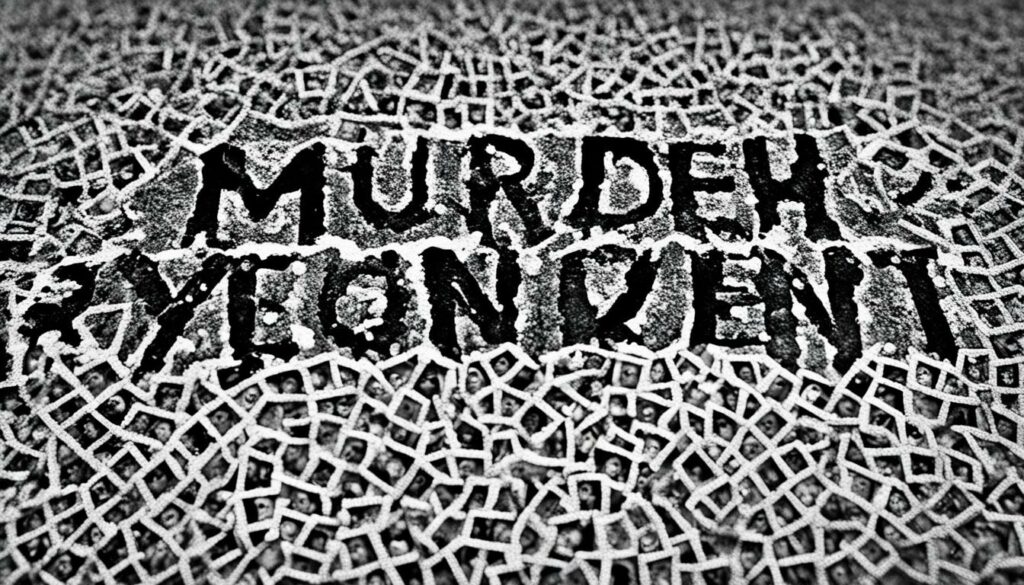Exploring the Reasons: Why Is Murder Bad?
Murder is a heinous crime that involves the unlawful killing of another human being without justification or valid excuse. It is considered one of the most serious offenses in society due to its ethical implications and the immense harm it causes to individuals and communities. In this article, we will delve into the reasons why murder is universally condemned and explore the consequences it entails.
Key Takeaways
- Murder is the unlawful killing of another human being without justification or valid excuse.
- It is considered a serious crime with profound ethical implications.
- Murder disrupts societal norms, creates fear, and undermines the well-being of individuals and communities.
- The psychological effects of murder can be devastating for both the victims’ families and the perpetrators themselves.
- Various factors contribute to the occurrence of murder, including societal and individual factors.
The Impact on Society
Murder has a significant impact on society. It disrupts the social fabric and creates fear and insecurity among the population. It goes against societal norms and values, which prioritize the preservation of life and the well-being of individuals. Society as a whole suffers from the loss of valuable members and the psychological trauma caused by acts of murder.
When a murder occurs, the repercussions are far-reaching. Families and loved ones of the victim bear the unimaginable pain of losing someone dear, while communities are left grappling with the devastating consequences. The ripple effect of murder extends beyond the immediate victim and perpetrator, leaving lasting scars on society as a whole.
The societal impact of murder can be seen in various ways. First and foremost, the loss of life is irreplaceable. Each individual has inherent worth and contributes to the diversity, growth, and progress of a community. When lives are cut short, be it through intentional acts of violence or crimes of passion, society loses the potential for greatness and the richness of unique perspectives and talents.
Murder also erodes the fabric of trust and safety within communities. The occurrence of such heinous crimes breeds fear and insecurity among the population, leading to a breakdown in social cohesion. Individuals may feel reluctant to go about their daily lives, fearing for their own safety and the safety of their loved ones. This sense of vulnerability can have a profound impact on the overall well-being and quality of life within a community.
The impact of murder is not isolated to the present moment but resonates far into the future. It is a stark reminder of the fragility of life and the importance of upholding societal values that prioritize the safety and well-being of all individuals.
Moreover, murder challenges the norms and moral standards that underpin a functioning society. The act of intentionally taking another person’s life violates the fundamental principles of respect for human dignity and the sanctity of life. Across cultures and civilizations, murder has consistently been condemned as an act of extreme wrongdoing, reflecting the collective understanding that every human life should be revered and protected.
The societal norms around murder are rooted in a deep-seated belief that life is sacred and should be preserved at all costs. These norms serve as a foundation for the laws and legal systems that seek to punish and deter such acts. By acknowledging the profound impact of murder on society, we are better equipped to address the underlying causes and strive towards a more harmonious and compassionate world.
The Ethical Implications

Murder raises profound ethical questions. It goes against fundamental moral principles that prohibit the taking of innocent lives. The intentional killing of another human is seen as a violation of human rights and the intrinsic value of human life. The ethical implications of murder extend beyond legal consequences, touching on issues of justice, compassion, and respect for human dignity.
“The deliberate act of ending someone’s life for personal gain or satisfaction is a gross violation of our shared ethical values. It disrupts the moral fabric that holds society together and threatens the principles upon which we build a just and compassionate world.”
Justice demands that individuals be held accountable for their actions, especially when they result in the loss of innocent lives. The moral condemnation of murder transcends cultural, religious, and societal boundaries, highlighting the universal recognition of the value and sanctity of human life.
Murder challenges our notion of compassion and empathy. It disregards the suffering and the profound impact that the loss of a loved one has on families, friends, and communities. The ethical implications of murder remind us of our collective responsibility to create a caring and supportive society that upholds the dignity and worth of every individual.
The importance of ethical considerations in addressing murder
Recognizing the ethical implications of murder is crucial for guiding legal and societal responses. By understanding the moral dimensions of this heinous act, we can formulate a comprehensive approach that prioritizes justice, compassion, and the well-being of individuals and communities affected by this crime.
Addressing the ethical implications of murder requires a multi-pronged approach that encompasses:
- Prevention: By tackling root causes such as poverty, inequality, and violence, we can create conditions that reduce the likelihood of individuals resorting to violence and murder.
- Intervention: Early identification and intervention can help individuals at risk of committing murder access the necessary support systems, such as mental health services and social programs, to address underlying issues and contribute to their rehabilitation and reintegration into society.
- Restorative justice: Emphasizing restorative justice practices can promote healing and reconciliation for victims, their families, and the wider community, while also offering perpetrators opportunities for personal growth and understanding the consequences of their actions.
By examining the ethical implications of murder, we can foster a collective commitment to building a society where the inherent value of human life is upheld, and the devastating consequences of murder are minimized.
| Ethical Implications | Key Points |
|---|---|
| Violation of human rights | Murder disregards the fundamental right to life and the intrinsic value of human beings. |
| Challenges moral principles | Murder goes against universally recognized moral principles that prohibit the taking of innocent lives. |
| Justice and accountability | Murder demands legal consequences to uphold justice and ensure accountability for the loss of innocent lives. |
| Disruption of compassion | Murder undermines our capacity for compassion and empathy, disregarding the profound impact on families and communities. |
| Guiding prevention and intervention | Understanding the ethical implications helps shape comprehensive strategies that prevent murder and support individuals at risk. |
Understanding and addressing the ethical implications of murder is vital to creating a society that upholds justice, compassion, and respect for human dignity.
The Psychological Effects

Murder has severe psychological effects, both for the families and loved ones of the victims and for the perpetrators themselves. The loss of a loved one through murder can lead to grief, trauma, and long-lasting emotional pain. Perpetrators may experience guilt, remorse, or psychological distress as a result of their actions. The psychological impact of murder can be long-lasting and require professional support and therapy.
The aftermath of a murder leaves a profound impact on the emotional well-being of those involved. The families and loved ones of the victims often experience overwhelming grief, sadness, and a sense of unimaginable loss. Coping with the sudden and violent loss of a loved one can lead to intense emotional pain, despair, and even symptoms of post-traumatic stress disorder (PTSD).
Furthermore, the psychological effects of murder extend to the perpetrators themselves. After committing such a heinous act, they may experience a range of intense emotions, including guilt, remorse, and self-blame. The weight of their actions and the realization of the irreparable harm they have caused can have a profound impact on their mental well-being.
“The guilt of murder is like a shadow that never leaves your side. The weight of what I’ve done will haunt me for the rest of my life.” – Anonymous murderer
In some cases, the psychological effects of murder can lead to long-term mental health issues for both the victims’ families and the perpetrators. They may struggle with anxiety, depression, and difficulty trusting others, as well as experiencing recurring nightmares and flashbacks. The immense psychological trauma caused by murder often requires professional support, therapy, and a comprehensive healing process.
Addressing the psychological effects of murder is crucial not only for the well-being of those directly affected but also for the prevention of future acts of violence. Identifying and supporting individuals who have experienced or committed murder is essential to break the cycle and ensure their rehabilitation and reintegration into society.
The Impact on Families and Loved Ones
The families and loved ones of murder victims face unimaginable pain and grief as they grapple with the tragedy and loss. The sudden and violent nature of murder leaves an indelible mark on their lives, often leading to profound psychological and emotional distress.
- Grief: Families and loved ones of murder victims experience intense grief, mourning the loss of their loved ones. The grief process may involve a range of emotions, including anger, sadness, disbelief, and even denial.
- Trauma: Witnessing or discovering the murder of a family member or loved one can cause severe psychological trauma. The trauma may manifest as nightmares, flashbacks, anxiety, and hyper-vigilance.
- Complicated grief: In some cases, families and loved ones may experience complicated grief, which is characterized by an extended and intense grieving process. Complicated grief may involve feelings of confusion, detachment, and an inability to come to terms with the loss.
Support and therapy can play a vital role in helping families and loved ones navigate the complex emotions and challenges that arise in the aftermath of murder. Counseling, support groups, and other resources can provide much-needed assistance in the healing process.
Types of Murder

In criminal law, murder is classified into various types, each distinguished by specific circumstances and intent. Understanding these classifications is crucial for the legal system to determine the appropriate charges and penalties for the crime. The following are the three main types of murder recognized:
Premeditated Murder
Premeditated murder refers to the intentional killing of another person with prior planning and malice aforethought. This means that the perpetrator had the intention to cause the death of another individual and took steps to plan and execute the act. Premeditated murder is considered the most serious form of homicide and often carries the harshest penalties under the law.
Manslaughter
Manslaughter is a type of murder that is committed without malice or premeditation. It involves taking someone’s life, but without the intent to cause death. Manslaughter can be further categorized into two subtypes:
- Voluntary manslaughter: This type of manslaughter occurs when the killing is provoked by sudden heat of passion or a reasonable belief in the need for self-defense. It may involve a person acting impulsively or under extreme emotional distress.
- Involuntary manslaughter: Involuntary manslaughter refers to unintentional killings resulting from reckless or negligent behavior. The individual responsible did not have the intent to cause harm but exhibited a reckless disregard for the safety and well-being of others.
Quote:
“The classifications of murder help the legal system differentiate between varying degrees of culpability and intent. They provide a framework for determining appropriate charges and penalties, ensuring that justice is served in accordance with the specific circumstances of each case.” – Legal Expert
Understanding the different types of murder allows us to grasp the complexities and nuances of this grave crime. It helps us appreciate the distinctions in intent, planning, and responsibility that can ultimately impact the legal outcomes and sentencing for those involved.
| Types of Murder | Description |
|---|---|
| Premeditated Murder | Intentional killing with prior planning and malice aforethought |
| Voluntary Manslaughter | Non-premeditated killing provoked by sudden heat of passion or self-defense |
| Involuntary Manslaughter | Unintentional killing resulting from reckless or negligent behavior |
Contributing Factors to Murder
Understanding the reasons why murder is considered bad requires an examination of the various factors that contribute to its occurrence. These factors can be categorized into societal and individual influences, which together shape individuals’ attitudes and behaviors that may lead to this heinous crime.
Societal Factors
A society’s economic conditions, levels of inequality, and prevalence of violence can significantly impact the likelihood of murder. Factors such as poverty and lack of access to basic resources can breed desperation and frustration, leading some individuals to resort to violence as a means of survival or retaliation. Inequality within a society can also foster resentment and a sense of injustice, fueling aggression and conflicts that may escalate to murder.
“Societal factors such as poverty, inequality, and violence can contribute to the occurrence of murder.”
Legal Consequences

Murder carries severe legal consequences, reflecting society’s condemnation of the crime and aiming to deter potential perpetrators from committing murder. In most countries, those convicted of murder face long-term prison sentences with no possibility of parole or even the death penalty.
The legal system treats murder as one of the most serious crimes due to the irreversible harm it inflicts on individuals and society. By imposing harsh punishments, governments seek to uphold justice, protect the rights of the victims, and prevent further acts of violence.
“The severity of the punishment must match the severity of the crime.”
– Judge Catherine Collins
To understand the gravity of the legal consequences, let’s take a look at the comparison table below:
| Country | Legal Consequences of Murder |
|---|---|
| United States | Long-term prison sentences without the possibility of parole or the death penalty |
| United Kingdom | Life imprisonment with a minimum term that varies based on the severity of the crime |
| Germany | Long-term prison sentences, usually ranging from 15 years to life imprisonment |
| Canada | Life imprisonment with eligibility for parole after a specified number of years |
Please note that the legal consequences of murder can vary across jurisdictions, depending on the specific legal frameworks and sentencing guidelines in each country.
By imposing significant penalties on individuals who commit murder, the legal system aims to discourage such acts and promote a safer society for all.
Murder and Mental Disorders
Some individuals who commit murder may have underlying mental disorders. Conditions such as antisocial personality disorder, psychopathy, or other psychiatric illnesses can contribute to a disregard for human life and the inability to empathize with others.
While not all individuals with mental disorders commit murder, understanding the psychological factors involved can help inform prevention and intervention strategies.
Psychological Factors Contributing to Murder:
- Antisocial Personality Disorder
- Psychopathy
- Other psychiatric illnesses
“Individuals with antisocial personality disorder often display a lack of remorse or empathy, making them more prone to engaging in violent behavior.”
By recognizing the psychological effects of murder and understanding the reasons for murder being bad, society can work towards early intervention, improved mental health support, and targeted strategies to prevent acts of violence.
| Mental Disorders | Characteristics |
|---|---|
| Antisocial Personality Disorder | Lack of empathy, disregard for social norms, impulsivity |
| Psychopathy | Superficial charm, lack of remorse or empathy, manipulative behavior |
| Other Psychiatric Illnesses | Varied symptoms depending on the specific disorder |
Prevention and Intervention
Preventing murder requires a comprehensive and collaborative approach that addresses both societal and individual factors. By tackling root causes and providing support systems, we can work towards a safer and more harmonious society.
Addressing Societal Factors
Societal factors such as poverty and inequality can contribute to an environment conducive to violence and crime. By implementing policies aimed at reducing socioeconomic disparities and ensuring equal access to basic resources, we can remove some of the underlying triggers for violence. Additionally, fostering a sense of community, promoting tolerance and empathy, and encouraging healthy relationships can help create a society that rejects violence and values peaceful coexistence.
Supporting Mental Health and Access to Resources
Individual factors, including mental health issues and lack of access to resources, can contribute to an increased risk of murder. Providing accessible mental health services, destigmatizing seeking help, and promoting early intervention is crucial in identifying and supporting individuals at risk. Additionally, ensuring access to education, employment opportunities, and basic necessities can contribute to reducing desperation and the likelihood of resorting to violence as a means of survival.
“Preventing murder requires a comprehensive and collaborative approach that addresses both societal and individual factors.”
Early Intervention, Education, and Community Programs
Early identification of individuals at risk of committing murder can help prevent tragedies. Implementing education programs that promote conflict resolution skills, empathy, and respect for life can create a generation that rejects violence and seeks peaceful alternatives. Community-based initiatives, such as mentorship programs, youth centers, and after-school activities, provide safe spaces for individuals to learn and grow, reducing their exposure to harmful influences.
Restorative Justice and Rehabilitation
For those who have committed murder, restorative justice practices can aid in the healing process for both victims’ families and perpetrators. These practices focus on accountability, reconciliation, and repairing the harm caused by the crime. Rehabilitation programs within the criminal justice system play a vital role in addressing the root causes of violence and providing individuals with the necessary skills and support to reintegrate into society successfully.
The Keyword-Related Image:
Conclusion
Murder is a heinous crime that is universally condemned due to its violation of ethical principles and the devastating impact it has on individuals and society. By intentionally taking another human life, murderers disregard the sanctity and intrinsic value of human life. This act goes against the basic principles of morality that prioritize the preservation of life and the well-being of individuals.
The consequences of murder extend far beyond the immediate loss of a life. It creates a ripple effect of pain, trauma, and psychological distress for the families and loved ones of the victims. The psychological effects of murder can be long-lasting and require professional support and therapy to help individuals cope with their grief and trauma.
From a legal standpoint, murder carries severe consequences. In most countries, those convicted of murder face long-term prison sentences or even the death penalty. These punishments reflect society’s strong condemnation of the crime and aim to deter potential perpetrators from committing murder.
In conclusion, understanding why murder is considered bad is crucial in preventing and addressing this crime. By acknowledging its ethical implications, devastating impact, and severe legal consequences, we can work towards creating a safer and more just society that upholds the sanctity of life and promotes the well-being of all individuals.
FAQ
Why is murder considered bad?
Murder is considered bad because it involves the unlawful and intentional killing of another human being without justification or valid excuse. It goes against ethical principles and societal norms that prioritize the preservation of life and the well-being of individuals.
What are the consequences of murder?
The consequences of murder are severe. Those convicted of murder often face long-term prison sentences or even capital punishment, depending on the jurisdiction. Murder disrupts the social fabric, creates fear and insecurity in society, and causes long-lasting psychological trauma for the families and loved ones of the victims.
How does murder impact society?
Murder has a significant impact on society. It disrupts the social fabric and creates fear and insecurity among the population. It goes against societal norms and values, which prioritize the preservation of life and the well-being of individuals. Society as a whole suffers from the loss of valuable members and the psychological trauma caused by acts of murder.
What are the ethical implications of murder?
Murder raises profound ethical questions. It goes against fundamental moral principles that prohibit the taking of innocent lives. The intentional killing of another human is seen as a violation of human rights and the intrinsic value of human life. The ethical implications of murder extend beyond legal consequences, touching on issues of justice, compassion, and respect for human dignity.
What are the psychological effects of murder?
Murder has severe psychological effects, both for the families and loved ones of the victims and for the perpetrators themselves. The loss of a loved one through murder can lead to grief, trauma, and long-lasting emotional pain. Perpetrators may experience guilt, remorse, or psychological distress as a result of their actions. The psychological impact of murder can be long-lasting and may require professional support and therapy.
What are the different types of murder?
There are different types of murder recognized in criminal law. Premeditated murder involves intentional killing with prior planning and malice aforethought. Manslaughter refers to killings committed without malice, such as in cases of provoked or voluntary manslaughter. Involuntary manslaughter occurs when a death occurs as a result of reckless or negligent behavior.
What contributes to the occurrence of murder?
Various factors contribute to the occurrence of murder. Societal factors such as poverty, inequality, and violence play a role. Individual factors such as mental illness, substance abuse, and a history of violence can also contribute. Socialization, upbringing, and exposure to violence in media or personal experiences can shape individuals’ attitudes and behaviors that may lead to murder.
What are the legal consequences of murder?
Murder carries severe legal consequences. In most countries, those convicted of murder face long-term prison sentences with no possibility of parole or even the death penalty. The severity of punishment reflects society’s condemnation of the crime and aims to deter potential perpetrators from committing murder.
Are there any links between murder and mental disorders?
Some individuals who commit murder may have underlying mental disorders. Conditions such as antisocial personality disorder, psychopathy, or other psychiatric illnesses can contribute to a disregard for human life and the inability to empathize with others. While not all individuals with mental disorders commit murder, understanding the psychological factors involved can help inform prevention and intervention strategies.
How can murder be prevented?
Preventing murder requires a multifaceted approach that addresses societal factors, such as poverty and inequality, as well as individual factors like mental health support and access to resources. Early intervention, education, and community programs can help identify and support individuals at risk of committing murder. Restorative justice practices and rehabilitation efforts can also contribute to reducing recidivism rates among murderers.
In conclusion, why is murder considered bad?
Murder is considered bad for numerous reasons. It violates ethical principles, causes devastating impacts on individuals and society, and carries severe legal consequences. Understanding the reasons behind the wrongfulness of murder can inform efforts to prevent and address this heinous crime, aiming to create a safer and more just society for all.







